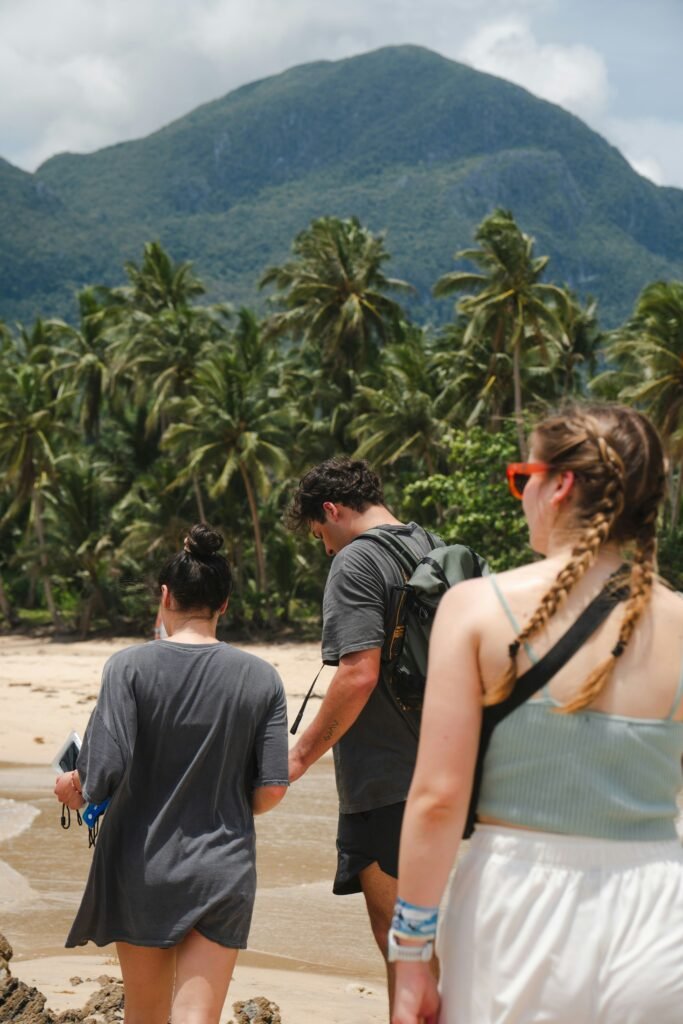Preparation is everything
And by preparation I don’t mean studying grammar and vocabulary, at least not the traditional way. You can easily prepare yourself by listening to music in the country’s official language. When I first familiarized myself with the Portuguese language, I looked up some popular Brazilian bands and totally fell in love!
The best thing about it? Without even understanding anything in the very beginning, you start to get a feel for the language and familiarize yourself with the new sounds and pronunciation.
Once you find something you like, listen actively, start imitating the sounds, sing along. It’s kind of similar to what babies do to learn — they listen to their parents until they start imitating them.
If you want, you can look up the lyrics of your favorite songs and translate them, so that you actually understand what they are about. By doing this there’s also a way better chance that you will remember the words and their meanings, rather than by just studying and memorizing some basic phrases and vocabulary from a book.

Go by yourself
If you’re afraid of speaking new languages abroad, this is a big one.
We all know it’s amazing to travel with friends, but if you travel alone, chances are much higher that you’ll step out of your comfort zone and connect with people you likely wouldn’t meet if you were traveling with your best friends. These people can help you learn a language quickly!
I also wouldn’t recommend going with a friend who speaks the language you want to learn, because then you will let them do all the work. And if you don’t practice speaking, you won’t improve.
Of course, this also depends on your personality, but during my first attempts to speak Portuguese, I felt better speaking to foreigners when I was by myself rather than with a friend who already spoke very well.
Go remote
This one goes hand-in-hand with opting for a solo travel experience. Try to stay away from the most touristic places and from dorms where everyone speaks your mother tongue.
Avoid meeting people from your own country! Not only does it widen your perspective, but you will also be forced to start communicating in another language.
One option to stay in more remote places away from the crowds is Couchsurfing. When I traveled Australia after school, I saw the most unique, interesting places and experienced some real off-the-beaten-path adventures with my Couchsurfing hosts, while learning English and escaping the crowds.
You could also volunteer in a place where you know people don’t speak your language. When you’re planning a trip with Worldpackers, you can talk to the host beforehand and ask them which languages are mostly spoken to check whether the work exchange opportunity suits you.
It might be a bit hard in the beginning, but the more you expose yourself to the new language, the faster you’ll learn.
Focus on communication
Focus on communication, not perfection.
When you learn a language in school, you learn vocabulary, verb tenses, conjugations, etc. I studied French in school for seven years, but I never practiced. If a French tourist on the street would ask me for directions, I could probably offer him a baguette but no directions.
The importance lies in communication!
Begin with the basics; learn to say “Hi!” Point at things, ask for their names. Learn how to ask about places. Try to understand the answers you receive, and if you don’t, keep asking questions.
Start ordering food in the language you are learning or go shopping at the local markets. It’s like a game. Every time you speak and engage, you collect one more piece of the puzzle until eventually, everything starts to come together and make sense.
I really recommend talking to the locals. The learning effect is doubled as you not only improve your language skills but also get some insights into their day-to-day life.
Even if you have to use elaborate hand gestures to clearly express yourself, you’ll be surprised by how much people will understand and how empowered you’ll feel after you’ve successfully communicated your point.

Make friends
The best way to learn a language naturally is by connecting with others. If your motivation to learn a new language is to understand a person you like, you’ll have way more success learning the language than if your motivation was to put the language on your CV.
My number one motivation to learn Portuguese was to be able to chat with Brazilians about their country and culture. It wasn’t about being able to conjugate the third-person plural of a verb in past progressive to impress them… it was about connecting with them.
On Worldpackers, you can find the ideal fit for the travel experience you want to have. The best part? In addition to giving back to the local community of your destination, you’ll be surrounded by like-minded people, which makes it easy to make friends while traveling alone.
During my most recent experience working at a surf hostel in Florianópolis, Brazil, I volunteered a few hours per day after which I’d have plenty of free time to chat with new friends and hostel guests, go on adventures, or sit down and study some grammar.
Doing a work exchange is an a great opportunity to befriend amazing people you wouldn’t meet in your life back home. This makes it an incredible tool for your language-learning journey.
When I first started traveling, I was quite shy and didn’t think I could ever become best friends with people who didn’t speak my mother tongue. But I was proven wrong again and again. Some of my closest friends speak Spanish or Portuguese and wanting to stay in touch with them is what now keeps me practicing my language skills every single day.
So, don’t be shy to put yourself out there and look for international friends who might end up becoming private mentors.
Spend your time how you spend it normally
Spend your time how you spend it normally — but do everything in your target language. Check if your favorite TV series is available in the language you are learning, or if your favorite books have been translated to it.
If you start doing the things you normally do in the language you are learning, you will learn naturally and have fun doing so! This could be anything from attending a yoga class to discussing a topic you find interesting to even learning an instrument or taking a cooking class.
Personally, I also really like finding interesting podcasts in the language I’m learning. Ask your new friends what they usually watch, read or listen to. They will give you good advice and point you in the right direction.
Finally, you might as well change your phone or computer to the language you are learning. Again, everything is about immersing yourself to the target language, as frequently and as much as possible.
Make mistakes
Don’t worry about making mistakes or not having the perfect pronunciation. People will like you for trying to speak their language, regardless of whether you’re using the wrong tense or speaking with an accent. Did you ever not like someone because of their accent? Having an accent makes you unique!
Making mistakes is a natural part of any learning process. Don’t let fear of making mistakes hold you back from speaking.
Believe me, the sooner you start speaking, the sooner you’ll be having fun. And when you’re having fun, you’ll become more motivated and have the courage to speak even more. And guess what, the more you speak, the faster you’ll progress and the less mistakes you’ll make!

